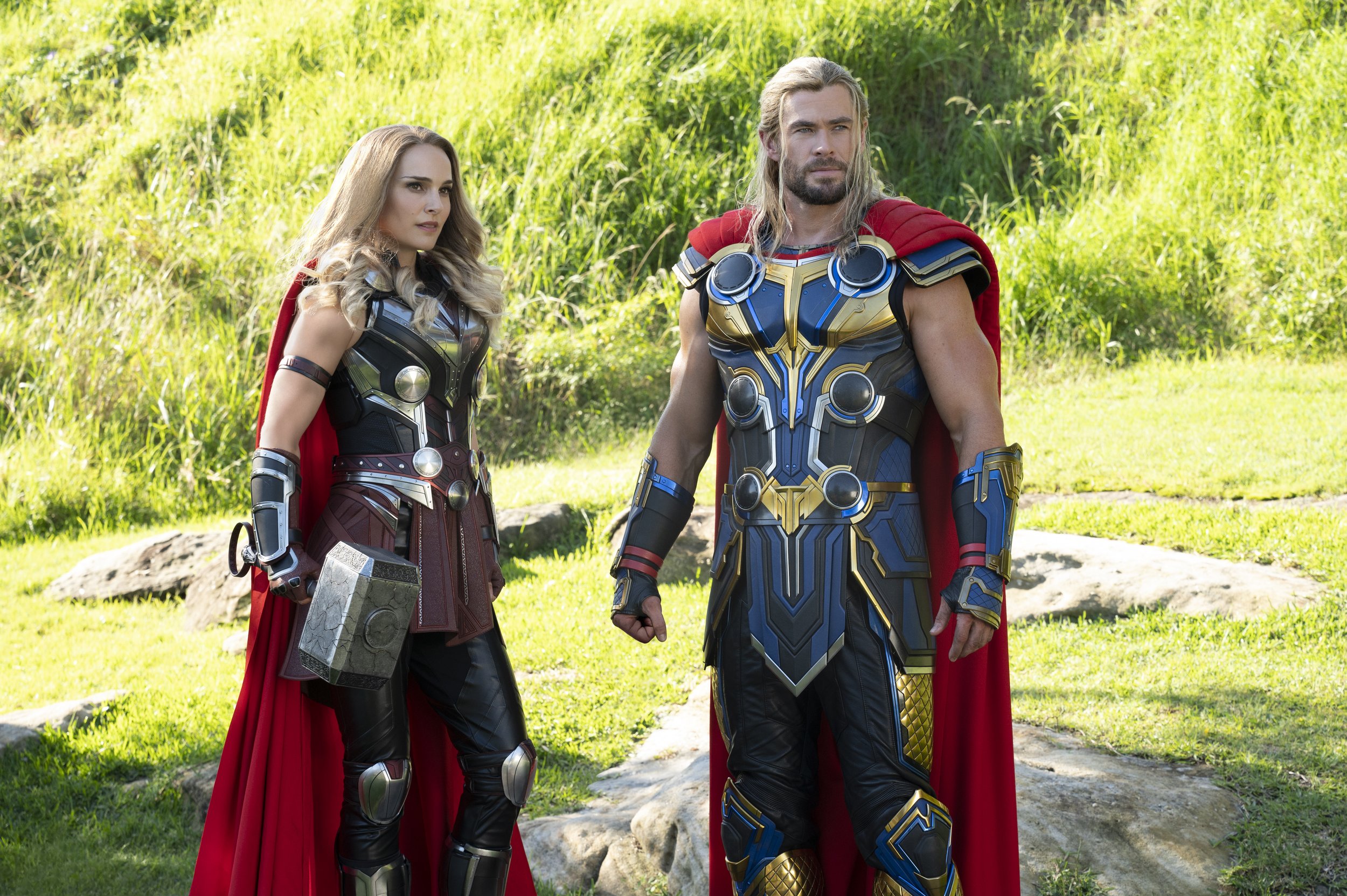Thor: Love and Thunder - Fun Ride with Quips, Personal Crises, Cameos and Jane With the Hammer
By Karen Gordon
Rating: A
After 28 films, it’s incredible that Marvel studios has anything new to say, never mind the ability to be fresh and entertaining.
And yet Thor: Love and Thunder, which is the 29th Marvel feature, and the fourth stand-alone Thor movie stuffs a great deal of story into its relatively slender running time of just slightly more than two hours, and is a lot of fun to boot.
Love and Thunder picks up from 2019’s Avengers Endgame, which saw Thor (Chris Hemsworth) deeply affected by overwhelming losses, sink into depression and an existential crisis that caused him to walk away from the things that outwardly defined him.
It’s double the Thunder Godliness in Thor: Love and Thunder.
He let himself go, and handed over the job of King of New Asgard to Valkyrie, (Tessa Thompson), and joined up with
the Guardians of the Galaxy, managing to annoy them as he worked on finding meaning and inner peace.
But that’s about to end. He’s’s pulled back into action by a threat that is coming straight for him. An alien named Gorr (Christian Bale), once a humble and pious man, feels he’s been betrayed by his god. Now in possession of the god-killing weapon the Necrosword, Gorr the God Butcher rampages through the universe with the aim of killing all deities, Thor included.
Thor parts ways with the Guardians and sets out, with his pal and sidekick Korg, (Taikia Waititi) to stop Gorr. They return to New Asgard – slyly reimagined as a tourist attraction - to find a battle raging in the main square. In the middle of it, he discovers that that his former girlfriend, Jane Foster (Natalie Portman), fights as Thor herself, and wields his once-shattered hammer Mjolnir.
Clearly, Thor and Jane have catching up to do.
But that will have to wait. Gorr kidnaps the city’s children. Thor sets aside self doubts, and with his battle team: Jane/Thor, Valkyrie and Korg, sets out to rescue the children and defeat the God Butcher.
Comically, that includes a stop in the home of the gods Omnipotence City, to appeal for help to the bloviating Zeus (Russell Crowe), the king of the gods. Crowe, a little weirdly plays the Greek deity with a heavy Italian-American accent, and an inclination towards irritation. But still, he’s fun to watch, and the film hints at a possible future career as a menace in the MCU.
Thor: Love and Thunder is the second MCU film directed by the creative whirlwind Taika Waititi, who shares a writing credit with Jennifer Kaytin Robinson. His previous film, Thor: Ragnarok took the MCU into more comedic, even Looney Tunes territory.
Love and Thunder is less broadly comic than Ragnarok, but it still leans heavily on humour, Waititi-style, by which I mean sly, silly, smart and smart-alecky. And thanks to Waititi’s crisp editing, the film’s comedic timing is impeccable.
As always with Marvel films, the fun and action are front and center, but grounded with darker and more difficult themes. The characters are often burdened with serious emotional issues that, like Thor’s depression, have come from their experiences battling bad guys, earthly or otherwise. Sadness and loss have always been mixed into the MCU, which has really grounded the series and made it more enjoyable and resonant.
Themes of losing one’s self, belief, betrayal, and grief are echoed through the Love and Thunder: Jane is ill, which is partly what has brought her together with Mjolnir. Gorr’s turn from piety to deadly atheist assassin comes from deep grief and a deep feeling of betrayal.
And then there’s Thor and his existential crisis, which has been the subject of comedy for the last few films, but it’s also defined a trajectory for the character, that presents an interesting study of modern masculinity.
An omnipotent figure, a god, a warrior, a superhero, the heir to Odin’s throne, Thor is a hyper-masculine archetype. He’s handsome, physically perfect and powerful. He’s conquered, defended, commanded armies, been a leader, saved his people, and led them to earth to New Asgard where they’re are safe.
The traditional ideas about masculinity say that these should define him as a success. But Thor, overwhelmed beyond his ability to deal, chose to retreat to try and figure himself out.
At a time when there are discussions around the issue of toxic masculinity including in media, Hemsworth, Waititi and the MCU overlords have taken Thor through a process that, in Love and Thunder, sends him out the other side with his strength returned and his empathy intact.
In doing so, whether they meant to or not, Thor emerges as a kind of archetype of what modern masculinity can look like. He’s a man who has had mental health issues, PTSD, who looks inward to solve his problems without losing himself, and who emerges with a better self-understanding, strength and compassion.
Those themes are there if you want to look for them. But with its cast of characters, including a series of cameos, and a fast moving plot, Thor: Love and Thunder is an enjoyable ride at face value.
But that streak of humanity sets it apart.
Thor: Love and Thunder, directed by Taika Waititi, written by Taika Waititi and Jennifer Kayton Robinson, Starring Chris Hemsworth, Natalie Portman, Tessa Thompson, Taika Waititi, Christian Bale, Russell Crowe. Opens in theatres, Friday, July 8.




